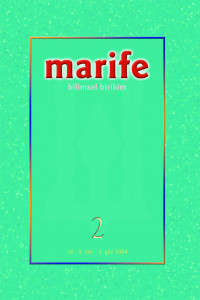Öz
This article tries to re-evalute Western scholars’ approach to the notion of qurrâ
in early Islamic literature. They generally minimize the amount of qurrâ in early years of
Islam during the life of the Prophet and his rightly guided caliphates. Therefore they
consider that the reports which show the existence of a number of qurrâ are either produced
by later Muslim scholars or it means ‘villagers’ (ahl al-qurâ) rather than ‘reciters’
(ahl al-qur’ân). Here we deal with the critical evalution of their approach. First of all we
focused on the role of the qurrâ in the expedition of Rajî’ and Bi’ri Maûna. Then we attempted
to analyse traditional information about them in the battle of Yamama. And finally
we investigated their status in the battle of Jamal and Siffin together with some
linguistic analysis of the term qurrâ. We have seen that the analysis of the orientalists
make the issue more complex due to absence of historical approach to it. Therefore for
the clarification of the role of qurrâ in early Islam one needs diachronic reading of historical
data.
Öz
Ayrıntılar
| Diğer ID | JA47UA42VT |
|---|---|
| Bölüm | Araştırma Makalesi |
| Yazarlar | |
| Yayımlanma Tarihi | 30 Eylül 2004 |
| Yayımlandığı Sayı | Yıl 2004 Cilt: 4 Sayı: 2 |
Bu eser Creative Commons Alıntı-GayriTicari-Türetilemez 4.0 Uluslararası Lisansı ile lisanslanmıştır.

